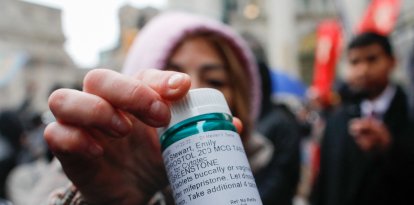Six United Nations of Islam cult members convicted of making followers perform forced labor
The victims, including young children, were deprived of food, forbidden to speak for weeks, locked in a dark basement, forced to work for more than 16 hours a day and beaten.

Department of Justice
The Department of Justice reported that a Kansas jury convicted six people on five counts of forced labor. Two others had already pleaded guilty to conspiracy to commit this crime. The abused included many minors who were separated from their parents.
They were Kaaba Majeed, Yunus Rassoul, James Staton, Randolph Rodney Hadley, Daniel Aubrey Jenkins and Dana Peach.
"According to the evidence presented in court during the course of the trial, the defendants were all former high-ranking members of the United Nation of Islam (UNOI), or were wives to the UNOI founder, Royall Jenkins," the Justice Department said in a statement.
Assistant Attorney General Kristen Clarke of the Justice Department's Civil Rights Division contended that the cult's leaders manipulated and abused the trust of their followers.
"The defendants betrayed this trust, exploiting young children in the organization by callously compelling their labor. Prosecuting this case is a testament to the Justice Department’s unwavering commitment to hold human traffickers accountable. The Justice Department will continue to vigorously investigate and prosecute parasitic criminals who target vulnerable victims to finance their lifestyles," Clarke said.
In that regard, the Justice Department explained that UNOI's tenets included many rules that members had to follow, as well as "obligations" or unpaid labor, and emphasized the eternal and negative religious consequences of noncompliance.
According to authorities, UNOI operated in several cities in the United States, including Kansas City, Kan.; New York City; Newark, N.J.; Cincinnati; Dayton, Ohio; and Atlanta, among others.
The department said the victims worked in restaurants, bakeries, gas stations, laboratories and a UNOI-owned clothing and sewing factory, often up to 16 hours a day. The victims also provided domestic and child care services in the defendants' homes. None of the victims ever received compensation for the years of work they performed at UNOI companies or at the behest of the defendants.
"In their former leadership roles in UNOI, the defendants agreed to compel the labor and services of over a dozen victims, including multiple minors, some of whom were as young as eight years old, between October 2000 and November 2012," the department highlighted.
"The victims all lived in deplorable conditions, in overcrowded facilities often overrun with mold, mice and rats. In contrast, the defendants and their immediate families lived comfortably," the statement added.
In addition, it was learned that the defendants regularly punished the victims for violating the rules. They denied them food, prohibited them from talking to other people for more than two weeks, locked them in a dark and scary basement, gave them extra work and beat them, sometimes in front of other people to create a climate of fear and intimidation.
"The defendants even held one victim upside down over train tracks because he would not admit to stealing food when he was hungry. Another victim drank water from a toilet because she was so thirsty after not being permitted to drink," the department detailed.
Sentencing hearings are reportedly scheduled for Feb. 18, 2025. Kaaba Majeed faces a maximum sentence of 20 years in prison, as well as mandatory restitution. The remaining defendants face a maximum sentence of five years in prison.


























